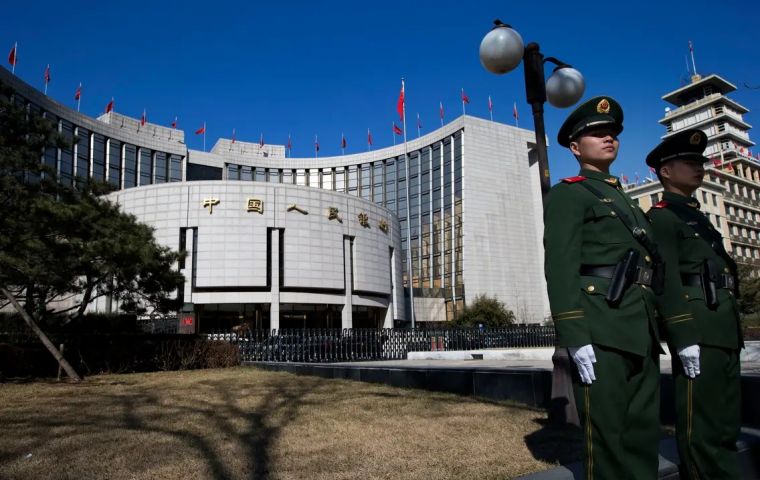MercoPress. South Atlantic News Agency
China lowers banks' reserves to stimulate the economy
 The reserve requirement ratio (RRR) cut will take effect April 25, the People's Bank of China (PBC), said in a statement on its website.
The reserve requirement ratio (RRR) cut will take effect April 25, the People's Bank of China (PBC), said in a statement on its website. China's central bank announced last Friday a flat reduction of 25 basis points of in banks' reserve requirements, as part of the anticipated pro-growth measures to stimulate the world´s second-largest economy. The slowing down of domestic consumption in the first half of the year, flared by the outbreaks in Shanghai, are expected to be stronger in the second half.
Thus the reserve requirement ratio (RRR) cut will take effect on April 25, the People's Bank of China (PBC), the country's central bank, said in a statement on its website.
An additional 25 basis points cut was announced for city commercial banks without cross-provincial operations and rural commercial banks with an RRR of more than 5%, according to the PBC, with the purpose of supporting micro firms and the rural economy.
The weighted average of RRRs at financial institutions would stand at 8.1% following the reduction, the central bank said, adding that the cut will release some 530 billion Yuan (US$ 83.18 billion) in long-term capital.
Earlier in the day, the PBC kept its key policy loan - the one-year medium-term lending facility (MLF) - unchanged at 2.85%, as the market is anticipating an imminent cut in banks' reserve requirements.
The borrowing costs of seven-day repurchase agreements also remained flat at 2.1%.
Friday's moves fell short of market expectations of an RRR cut by 50 basis points, mirroring two previous cuts last year, which might be coupled with an interest rate cut in MLF loans.
The most recent universal RRR cut by half a percentage point in December 2021 was intended to release about 1.2 trillion yuan in long-term funds.
The PBC fears imported inflation concerns amid global uncertainties and renewed virus outbreaks in Shanghai. The Ukraine war continues influencing wild volatility for oil and gas prices, as well as the speed with which the United States Federal Reserve will hike interest rates.
Likewise China's National Development and Reform Commission, the country's top planning agency, announced plans to ramp up infrastructure investment to bolster economic growth.
If the virus flare-ups in Shanghai can be controlled in the first half of the year, it's likely that consumption might rebound beginning the third quarter thereby offsetting a possibly shrinking trade landscape in the second half amid Fed rate hike-fueled sluggish external demand, he said.




Top Comments
Disclaimer & comment rulesCommenting for this story is now closed.
If you have a Facebook account, become a fan and comment on our Facebook Page!